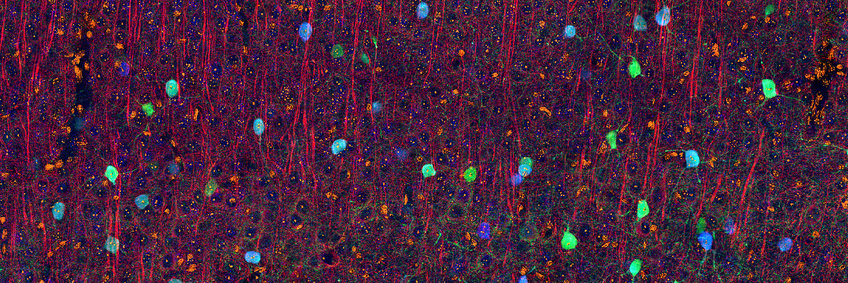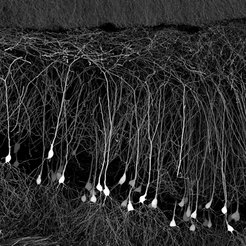
Mission / Vision
The Max Planck Institute for Brain Research is a fundamental research and scientific training institution focused on understanding the brain. The human brain is a formidably complex machine, composed of about one hundred billion neurons and trillions of connections, or synapses between them. Out of such a system, as if magically, arise perception, behavior and thought. The brain is often described as the "most complex machine in the known universe".
Brains are products of evolution, a response of biological organisms to selection pressure. Consequently, brains solve many complex, yet specialized problems: find food, identify and avoid danger, learn and recognize kin, learn from past associations, predict the near future, communicate, and in a few species, transmit knowledge. This all seems so simple. Yet we know that these problems are complex because our attempts at solving them with artificial machines have been disappointing so far. Today's computers are getting better at solving pure-computation problems (chess for instance). But they are still poor at solving object-, character- or face-recognition tasks, operations that our brains carry out effortlessly. And brains work with very little power (about 30W in humans). They are a triumph of efficiency.
Studying and understanding the brain is important for many reasons. First, it is a fascinating scientific challenge. Because of the diversity and complexity of the fundamental problems we face, modern neuroscience is an interdisciplinary science par excellence, involving (among others) molecular biologists, biochemists, geneticists, electrophysiologists, ethologists, psychologists, physicists, computer scientists, engineers and mathematicians. Understanding the brain requires reductionist approaches as well as synthetic ones. Simply put, it is a formidable and interesting challenge for scientists with a passion for fundamental research.

Second, understanding the brain is of paramount importance for medicine. Data from the World Health Organization show that psychiatric and neurological diseases are among the main causes of disability and disease. Indeed, in 2005, brain disorders accounted for 35% of the economic burden of all diseases on the European continent. While our institute is not a medical institution, the knowledge we produce (e.g., on mechanisms of neural development, synaptic plasticity or brain dynamics) is of fundamental relevance for applied neurological research (e.g., neurodegenerative diseases, psychiatric disorders).
Our goal is to be an institution where some of the best scientists in the world work together to understand the operations and function of nervous systems. Our scientific focus is on circuits, or networks of interacting parts-molecules in a neuron, neurons in a local circuit, circuit-to-circuit communication. Experimental work at the Institute is carried out on non-primate animal species (e.g., rats and mice, fish), in an interdisciplinary, interactive setting, located in the heart of the natural sciences campus of the Goethe University in Frankfurt am Main. We are committed to fostering a diverse, equitable, and inclusive environment, ensuring that all scientists can thrive and contribute their unique perspectives. Our immediate neighbors and scientific partners are the Biology, Chemistry and Physics Departments of the Goethe University, the Frankfurt Institute of Advanced Studies (FIAS) and the Max Planck Institute of Biophysics. We also have close relationships with the Medical Science, and Computer Science (Center for Scientific Computing) and Mathematics Departments of the Goethe University, and the Ernst Strüngmann Institute, whose focus is on Cognitive Neuroscience.
Research overview
Research at the Max Planck Institute for Brain Research focuses on the operation of brain circuits. It is currently carried out in three scientific departments (Helmstaedter, Schuman and Laurent), two Max Planck Research Groups (Barker and Stempel) and a Max Planck Fellow Group (Acker-Palmer) located in our new Institute building (Riedberg), as well as in the Emeritus Department of Wolf Singer located in the old Institute building (Niederrad).
Circuit Function
Brain circuits can be considered at many different levels. These levels span the interests of the MPI for Brain Research.
For example, the intracellular protein network present in synapses includes all essential features of circuits including connected elements, communication, regulation and feedback. In response to signals from other neurons in a circuit, synapses interpret their inputs and transform them into outputs. Some inputs modify the intracellular network by modifying the local ionic and protein environment, resulting in a change in the synaptic response.
Neural networks are another fundamental unit of brain function: the brain computes (transforms) inputs (external, via senses, or internal, such as thoughts, memories etc) into adaptive outputs (motor behaviors, percepts etc), according to some rules, or families of rules, that most often emerge from its components and their interactions; interestingly, those rules can change with time, experience, or context.
Our common goal is a mechanistic understanding of the components of these networks, of the structural and functional circuits which they form, of the computational rules which describe their operations, and ultimately, of their roles in driving perception and behavior. Our experimental focus is on all scales (in space and time) required to achieve this understanding. That is, some of our work focuses on networks of molecules in dendritic compartments, while other focuses on networks of interacting brain areas. This requires analyses at the molecular, cellular, multi-cellular, network and behavioral levels, with the full understanding that macroscopic phenomena (spatial patterns, dynamics) can be scale-dependent; thus, while essential, reductionist approaches are not always sufficient, emphasizing also the need for theory.
Interdisciplinarity
Neuroscience is an archetype of interdisciplinary science: a typical project may require a good level of understanding of electronics, molecular biology, optics, computer science and informatics, expertise with matrix algebra or image processing. Neuroscience is indeed a science of systems and increasingly defined not by its tools but by questions. Today already, a typical study in the neuroscience of circuits may combine approaches such optics and molecular biology, electrophysiological recordings, analysis of terabyte-sized datasets and large numerical simulations.
Our institutes thus offers an interdisciplinary environment for graduate and postgraduate education, such that every student should become an expert in some areas and knowledgeable in most others. Our institute provides a training with both breadth and depth components, in an environment where interactions between labs, faculty, scientists are the norm and where science is generally multidisciplinary. In this regard, the positioning of our new institute building at the nexus of the natural sciences of the Goethe University, the presence of Frankfurt Institute for Advanced Studies and Max Planck Institute of Biophysics next door, and the already established research links between some of our labs with the Math Department and Center for Scientific Computing, as well as the neuroscience faculty at the medical school, place us in a rare position to offer this kind of interdisciplinary training.
